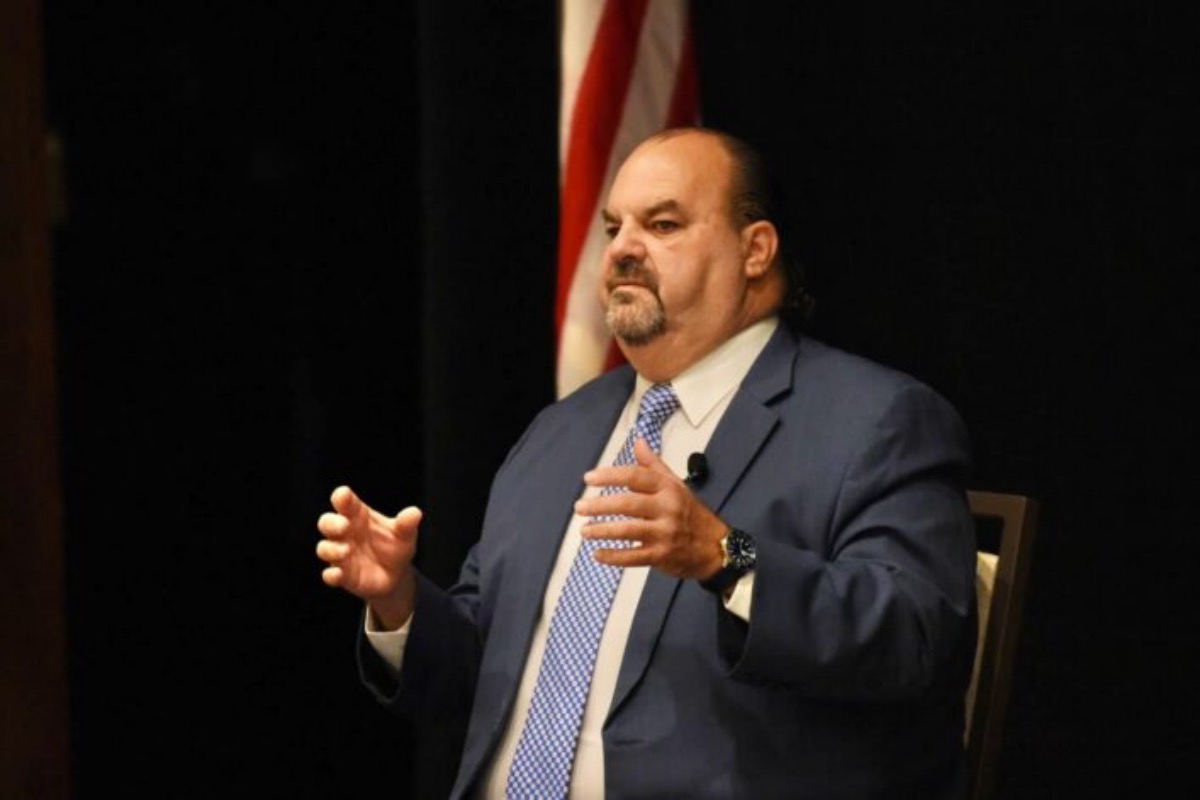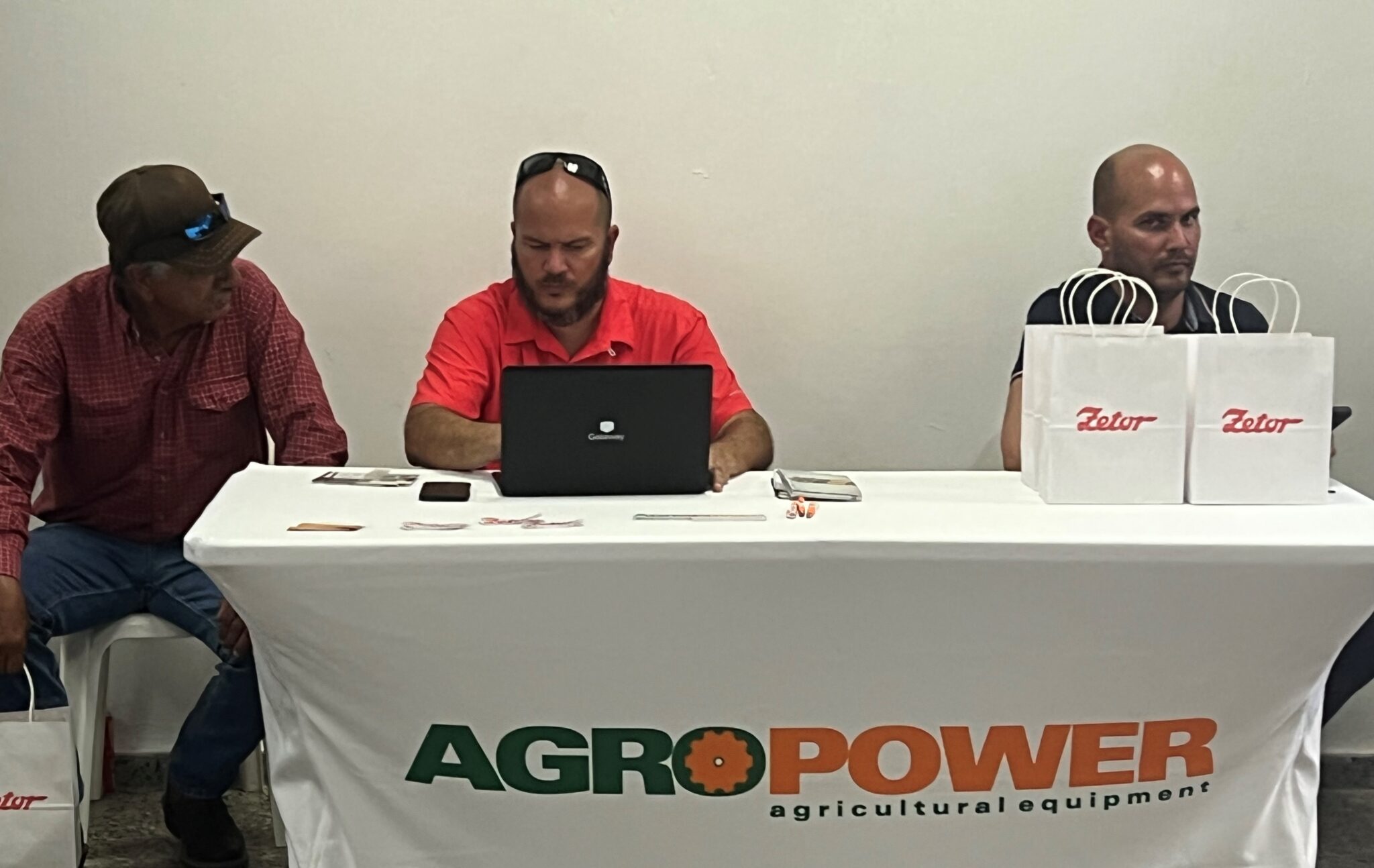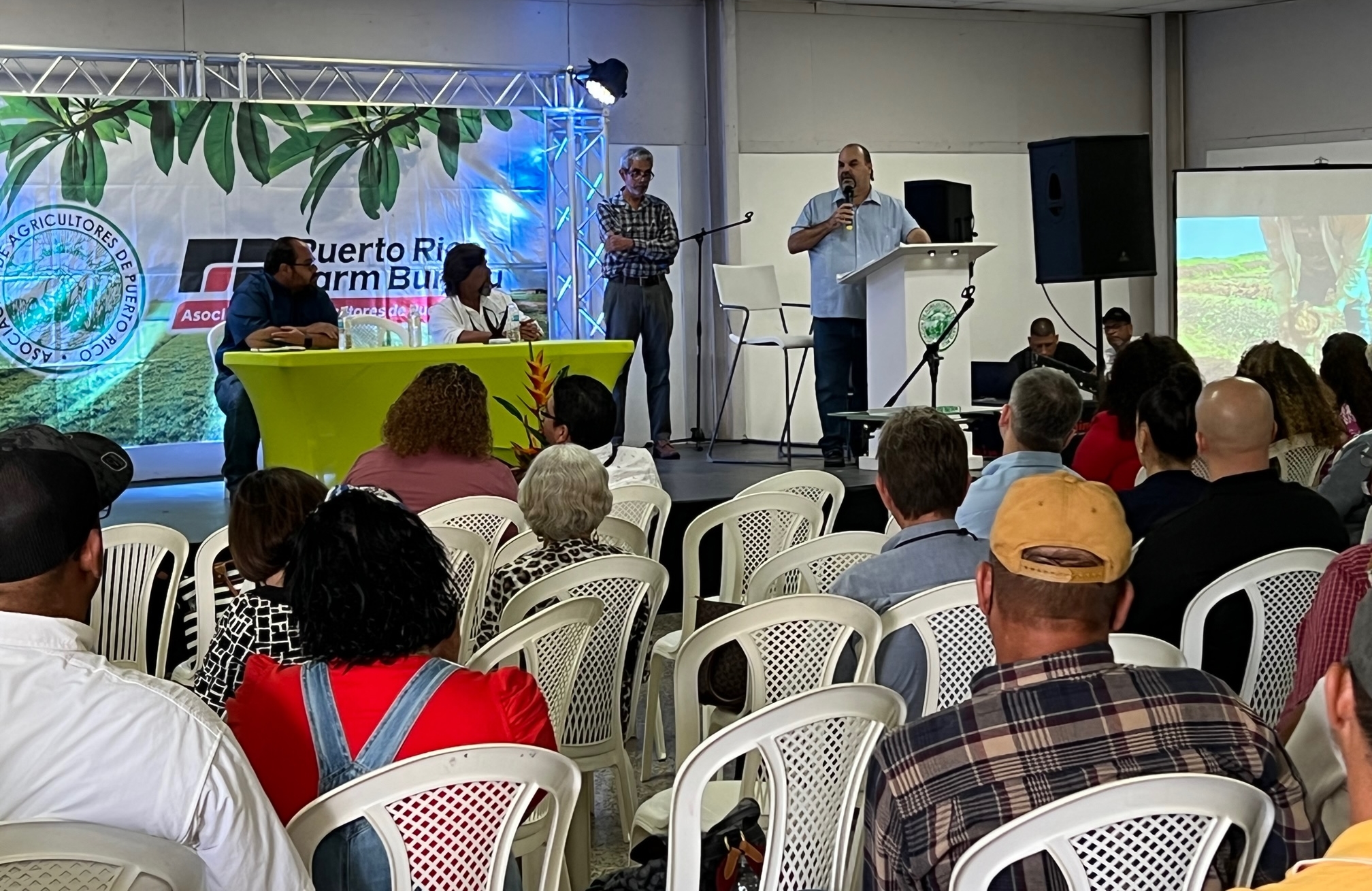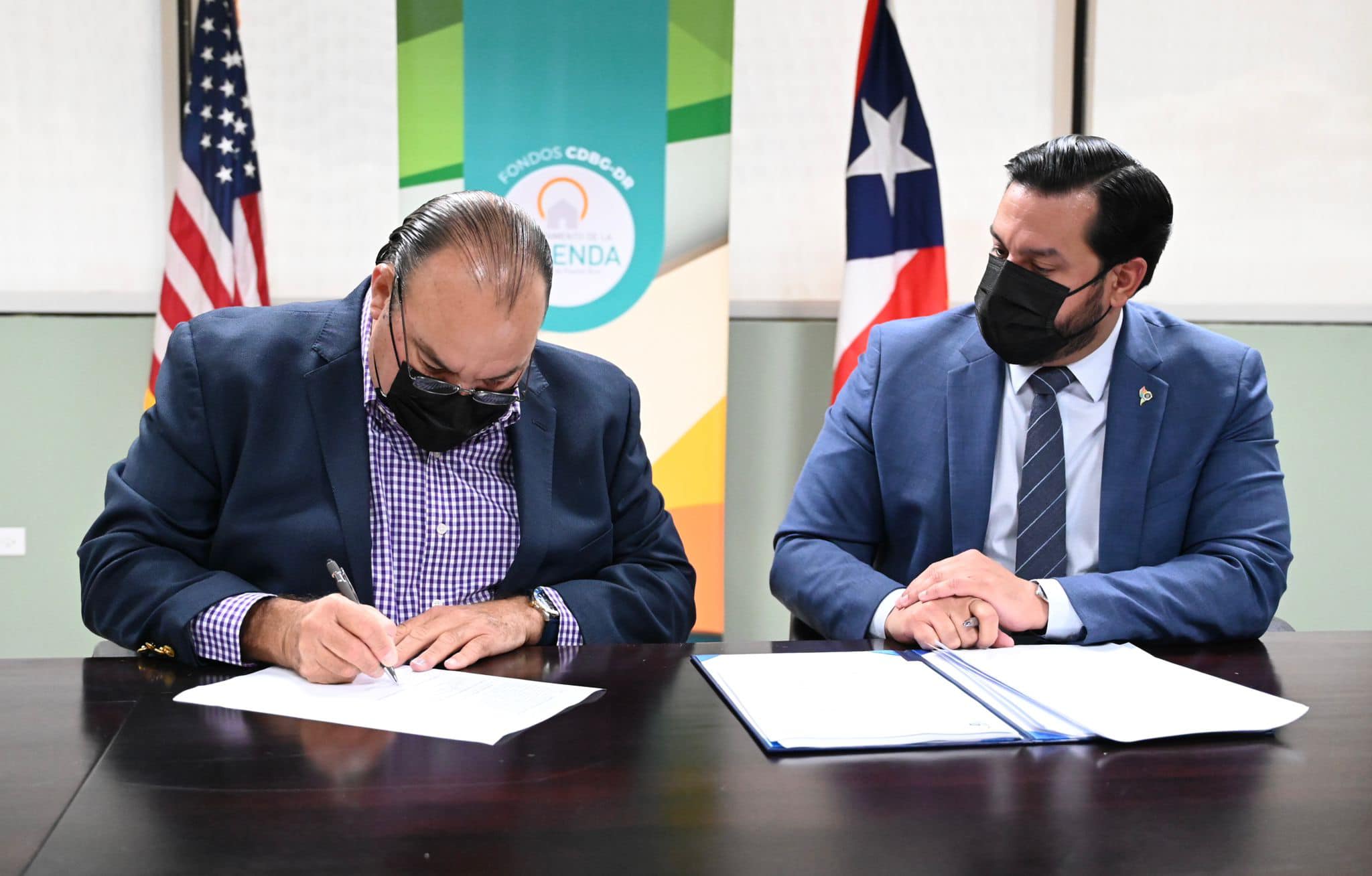

Ramón González Beiró, Puerto Rico’s secretary of agriculture (Puerto Rico Department of Agriculture/Facebook)
By VANESSA COLÓN ALMENAS, Centro de Periodismo Investigativo
SAN JUAN, Puerto Rico — Agriculture Secretary Ramón González Beiró spoke to a group of farmers gathered at the most recent assembly of the Puerto Rico Farm Bureau held Thursdays ago in Arecibo. A few steps away, at an exhibition table, his son Ramón M. González Bennazar was hustling to sell equipment from a firm called Agro Power, a company owned by his father whose equipment was on exhibition and can be bought with subsidies from the federal Re-Grow PR Urban-Rural Agriculture Program.
In August 2021, Agro Power earned $120,000 in sales of equipment purchased by farmers through Re-Grow program grants, according to information provided by the Puerto Rico Department of Housing, which oversees these federal funds. In that same month, Secretary González Beiró exhibited his tractors in the Farm Bureau’s annual assembly held in Moca.
The Re-Grow program is intended to increase food security as well as improve and expand agricultural production for economic revitalization.
González Beiró doesn’t think his presence in this and other agriculture-related activities could pressure farmers to buy equipment from the company in which he and his wife, Mariliana Bennazar Torres, are direct beneficiaries. The equipment is showcased and promoted at events that he attends or that are sponsored by the Department of Agriculture.


A table set up by Agro Power, owned by Agriculture Secretary Ramón González Beiró, was part of the exhibition at the Puerto Rico Farm Bureau’s Annual Assembly held at the Club de Leones in Arecibo. (Vanessa Colón Almenas/CPI)
For Puerto Rico’s top agriculture official, any real or apparent conflict was resolved with his inhibition in matters that the agency brought before him for consideration regarding his agriculture-related companies: Agro Power Corp., AG Agro, and Agriart LLC. In addition, he insists that before taking the oath he created a blind trust, which is a legal structure that manages these three companies without González Beiró having interference in their administration while he holds the position of secretary.
“I have an inhibition approved by [the Office of Government] Ethics not to intervene in any of those programs where there could be an inkling that someone might think that I’m influencing them to buy one equipment or another. That’s not me. That’s not true,” the secretary told the CPI, who interviewed him a few steps away from where the equipment and the Zetor tractors that his company sells were on display.
“I’m the one who dictates public policy on agriculture. I don’t grant incentives. I don’t sign off on incentives. They’re approved by the Department of Agriculture’s work teams. Each area has someone who approves them—there’s a committee that approves them,” González Beiró explained. “In the case of the investment program, there are three who are legally, by regulation, the ones who approve them. The secretary does not intervene.”
The handling of the Re-Grow program grants, which closed its application period on April 14, was one of the matters the secretary discussed at the farmers’ meeting.
“I know that many of you may be here so that I can talk to you about the black cloud, right, about Re-Grow. Re-Grow has undergone some changes for the better, in which we, with the governor, structured or were allowed to restructure the flow charts for Re-Grow cases,” said the secretary in his message to more than 100 farmers gathered in the Club de Leones in Arecibo.


Ramón González Beiró, Puerto Rico’s secretary of agriculture, addresses farmers during the Puerto Rico Farm Bureau’s annual assembly. Behind and standing, Héctor I. Cordero Toledo, president of the bureau. (Vanessa Colón Almenas/CPI)
He assured that a new process began during the last week of August, which eliminated bureaucratic steps, and that the Department of Housing will allocate “every dollar that is needed to ensure that each farmer, who applied and is eligible, will get paid.”
“Now the qualification is going to be much simpler, but all that takes a lot of work. It takes a lot of effort,” González Beiró said. “The governor had to give the order at our request. I thought the day I told [the governor], [officials] Jorge Campos and Javier Lugo were with me, that he would fire me when I crudely told him what was happening with Re-Grow. But he righted the ship because the governor is a man of action.”
All in the Family
The González Bennazar family comes from a long line of farmers. The secretary’s parents also have agricultural companies, González Agro being one of them, which he managed before becoming head of the Agriculture Department, according to the positive report from the Senate Nominations Committee that recommended his confirmation.
“All these farmers are my brothers. No one would even dare to ask me here today about a tractor, about a brand,” said González Beiró, who has been linked to the Farm Bureau since 1995 and was its president twice. “I’m not going to harm my family’s reputation of more than 100 years of farming in Puerto Rico to sell a tractor.”
However, several competitors who exhibited their tractors at the Farm Bureau’s assembly shared their discomfort with the CPI, believing there was unfair competition due to the secretary’s access to insider information on subsidies, decrees, and farmers that they say he could forward to Agro Power.
In December 2020, González Beiró established a blind trust to which he transferred his and his wife’s shares in the companies. He and his wife, a pharmacist, own 100 percent of the shares of Agro Power and AG Agro Inc. Meanwhile, he has an 18 percent stake in Agriart LLC, according to documents from the Office of Government Ethics of Puerto Rico (OEG, in Spanish).
Agro Power was registered in September 2010 with the State Department and since then has been engaged in the “purchase and sale, rental, import and export of equipment related to agriculture and construction,” according to corporate documents. González Beiró was listed as president of the company until December 2020, and now remains as the corporation’s resident agent.
His two sons, Ramón M. González Bennazar and Manuel A. González Bennazar, are also in the farming business. In fact, they were named president and secretary/treasurer, respectively, of Agro Power.
Buying From Agro Power With Re-Grow Grants
With a $92 million allocation, Re-Grow is one of the federally funded disaster recovery programs known as Community Development Block Grant Disaster Recovery. Last November, the Puerto Rico Department of Housing signed a $9 million deal with the Department of Agriculture to run Re-Grow. Previously, the Puerto Rico Science, Technology and Research Trust ran the program through a $30 million contract.


Agriculture Secretary Ramón González Beiró, left, and Housing Secretary William Rodríguez Rodríguez signed an agreement that allows training Department of Agriculture staff to oversee the Re-Grow program in Puerto Rico. (Puerto Rico Department of Agriculture/Facebook)
Re-Grow awards subsidies between $25,000 and $150,000 to small and medium-sized agricultural businesses to make purchases or conduct activities that boost the economy. Farmers must submit cost sheets that include three quotes for each item or job requested.
Agriculture Deputy Secretary Jorge A. Campos Merced is responsible for signing off on these grants. González Beiró assured the CPI that he does not know from which companies the subsidized farmers buy their equipment. The Office of Government Ethics’ approved inhibition says that everything related to his companies in the Department of Agriculture was delegated to the deputy secretary.
After the CPI requested the total number of contracts awarded through July of this year and their respective cost sheets, the Department of Housing delivered a copy of 174 agreements and 85 cost sheets with crossed-out names of those who received the money, the towns where they are located, and the names of the suppliers.
The CPI made a second request to the Department of Housing to provide the number of contracts to purchase equipment and tractors from R&B Power, Rico Tractor, Agro Power, and other companies. Housing delivered a preliminary list identifying 56 agreements and their respective suppliers.
Agro Power’s name appears four times on the preliminary list of suppliers that sold equipment to the grantees. Last August, Agro Power made $48,650 from the sale of a tractor and other equipment. That same month, it sold a tractor through the program for $71,000. In two other grants, for $84,000 and $28,879, Agro Power appears with Rico Tractor as a supplier, but the total amount purchased from each company could not be broken down due to information that was redacted in the agreements.
The CPI was able to identify models of the Zetor-brand tractors in two other grant agreements, as well as in a cost sheet, but the final sale went to other companies, according to data that the Department of Housing provided.
Agro Power appears as the only dealer of these tractors in Puerto Rico on the website of the stateside company that distributes the Czech-made Zetor brand. Agro Power also sells equipment such as tills, sprinklers, and fertilizer spreaders.
The contracts for these grants are not registered with the Office of the Comptroller.
Intervention for Re-Grow to Shift to Agriculture
Since May 2021, when the Science Trust managed the funds, small farmers claimed that the guidelines to request them did not respond to their reality in Puerto Rico.
In October 2021, the agriculture secretary blasted the Science Trus’s management of these funds and assured that Gov. Pedro Pierluisi wanted Re-Grow to go to the Department of Agriculture. That same month, the Farm Bureau also recommended to the House Agriculture Committee that the funds go to the Department of Agriculture.
González Beiró told the CPI that he had “several meetings with the housing secretary” William Rodríguez Rodríguez, to bring about the transfer of the Re-Grow program to the agency he has led since his appointment in January 2021.
The housing secretary told the CPI that 176 requests were in the process of being granted as of July 21 of this year, and 174 had already been disbursed.
Blind Trust
The Office of Government Ethics said it sees no conflict in Agro Power’s sales with grants approved through the Re-Grow farmer program, although the secretary of Agriculture serves as that company’s resident agent.
“To the extent that the Secretary does not intervene in decision-making, nor does he violate the [blind] Trust, he does not interfere with the Organic Law of the Office of Government Ethics of Puerto Rico,” the OEG told the CPI in a written statement.
The Puerto Rico General Corporations Act requires corporations to have a resident agent in Puerto Rico, whose office “must be open during business hours to receive summons and perform the duties of a resident agent who must be in that same office.”
Although they don’t make decisions nor are necessarily linked to the corporation’s day-to-day, the resident agents receive the summons, notifications, and claims delivered to the company, explained Jose Efraín Hernández Acevedo, director of the InterAmerican University of Puerto Rico’s Department of Social Sciences.
“By appearing as a resident agent of a corporation that at the same time does business with the government and with an agency that he directs, this person undoubtedly seems to be setting up a conflict of interest,” said Hernández Acevedo, a professor of public administration and studies the topic of government ethics.
“There isn’t going to be a split between this figure of the resident agent and the director of the agency and past owner of those corporations, which are now under a blind trust, because everyone knows that when their government job ends, they will go back to them,” said the academic.
A corporation is a legal fiction that “has no flesh, no feet, no head,” which is why the figure of the resident agent is created to appear as a representative of the corporation, Hernández Acevedo explained. “At the end of the day, they’re looking out for that corporation’s interests, because they have to keep the directors informed of everything that comes in, of the information that comes into their power, whether lawsuits or claims,” he said.
As the head of an agency, the resident agent has access to privileged information that other competitors of the companies that are under this blind trust don’t have, said Hernández Acevedo.
“That could result in an unjustified advantage for those corporations [competitors]. And that’s where the conflict of interest would materialize,” the professor said.
In other words, the resident agent is “the ambassador” of a corporation.
“You don’t have to be very creative to figure that a person who runs a government agency, who knows that some federal money is going to come in to procure equipment, isn’t going to give them that information or isn’t going to find a way to pass this information on to those companies for which he is now serving as a resident agent,” he said.
The OEG says a blind trust is an “obligatory contract for which certain State authorities must dispose of all or part of their assets and delegate the administration of their assets and obligations to prevent possible conflicts of interest that affect their public duties.”
Prof. Ana Cristina Gómez Pérez, a professor at the University of Puerto Rico Law School and an expert on trusts, explained that a blind trust is generally required of senior executives or government officials, “whose duty it is to establish public policy or regulate a market in which they have assets.”
Presidents of the United States, such as Jimmy Carter and George Bush, have created blind trusts. In Puerto Rico, former Gov. Luis Fortuño established one, and when Juan Zaragoza was nominated in 2014 for secretary of the Department of the Treasury, the OEG recommended the creation of this legal structure for his businesses.
“Through the creation of a blind trust, the official as a constituent moves the assets so that a third party manages them and the official can make decisions independently and without inciting that his decisions may directly or indirectly benefit or influence his assets,” Gómez Pérez added.
When asked if an official could hold a role in a corporation managed by a blind trust, Prof. Gómez Pérez explained that in Puerto Rico there are no specific regulations for blind trusts. “There are no prohibitions or provisions on corporations or assets that are part of the trust,” she said.
González Beiró appointed as administrator or trustee agronomist Juan Boris Corujo Orraca, who he is not related to and who is a delegate of the Puerto Rico Sailing Federation, which the agriculture secretary chairs. Both work voluntarily in the sports organization.
“I’ve been friends with him for more than 20 years,” said Corujo Orraca, who assured the CPI that he has meetings with González Beiró solely related to matters of the Puerto Rico Sailing Federation.
For the blind trust to fulfill its purpose, the OEG establishes several requirements, among them that “there will be no communication, directly or indirectly, between the trustee and the public official, unless it is in writing and refers to the notification to the trustee over any asset whose possession is prohibited by law or regulation.”
Doesn’t Recall Resigning
González Beiró remained Agro Power’s resident agent until August 3, 2021, when he resigned without naming a successor. Three months later, on November 1, he resumed those duties, according to documents in the Registry of Corporations. On November 8, he signed the agreement with the Department of Housing to run the Re-Grow program.
“Why did you resign from the role of resident agent of Agro Power?” When asked the CPI why he resigned from his role as resident agent of Agro Power, Secretary González Beiró said he “[doesn’t] remember resigning,” though an amendment certificate from the Department of State confirms his resignation.
A resident agent can be paid for their duties, but the secretary told the CPI that he does not charge “anything” for that role in the corporation.
In 2021, González Beiró made $166,824 in income and salaries, compensations, and other income, while in 2020 he made $81,550, according to financial reports submitted to the OEG.
At the time of this publication, the Registry of Corporations does not reflect financial statement reports from Agro Power for 2020 and 2021, whose extension to file them expires in October. The last report submitted was in 2019, with a total of $310,333 in capital.
The State Department explained to the CPI that Agro Power’s corporate charter was canceled in September 2021 because a resident agent was not appointed on or before 30 days after González Beiró’s resignation, as the General Corporations Act requires. As a result, the company’s ability to do business was nullified.
On November 3, 2021, after González Beiró returned as resident agent, Agro Power’s corporation status was reinstated.
“It’s as if [the cancellation of the corporation] never happened and the transactions during that period are valid,” said Carlos Díaz Olivo, an expert in corporate law and a professor at the UPR Law School.
‘I Would Be Incapable of Doing Something Like What You Imply’
The CPI asked Secretary González Beiró how he expects someone to believe that he does not share privileged information from the Department of Agriculture with Agro Power’s board of directors, whose members are his sons.
“First of all, because we must believe that there are still decent people and decent families in Puerto Rico, with principles and values for generations,” he said. “All my life I have led my island’s farmers, and today, from this chair, I can change the course of Puerto Rican agriculture. I would never do something like what you imply. My two sons are examples of young people dedicated to the land, and I’m proud of them.”
***
Vanessa Colón Almenas is a corps member of Report for America.



[…] Credit: Source link […]
[…] source […]